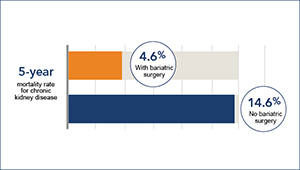Obesity
Research overview
“Obesity is the number-one health problem in the United States because it negatively affects our population’s health more than any other condition,” said Kaiser Permanente Washington Health Research Institute Senior Investigator David Arterburn, MD, MPH. Kaiser Permanente Washington researchers are doing practical research to learn how doctors, patients, families, employers, and policymakers can best work together to prevent and treat obesity.
“We’re focusing on three ways to halt the obesity epidemic,” said Senior Investigator Dori Rosenberg, PhD, MPH. “We’re helping to change obesity-promoting environments, bringing evidence-based prevention and treatment programs into health care systems, and helping people develop lifelong healthy diet and activity habits.”
Kaiser Permanente Washington obesity research areas include:
- reducing sedentary behavior and promoting physical activity and healthy diet in various age groups, populations with chronic conditions, and families;
- shared decision making to help patients find the best way to a healthy weight;
- implementing health coaches in primary care to support behavior changes;
- social networks that support lifestyle change programs;
- relationships between medications and genetic factors in developing obesity;
- health system, community, and national policies that address obesity;
- relationships between obesity and depression, diabetes, and other conditions; and
- long-term benefits and risks of bariatric (weight loss) surgery.
“Obesity is caused by many factors, so at Kaiser Permanente Washington, we’re working on many levels,” said Paula Lozano, MD, MPH, a senior investigator and Kaiser Permanente Washington’s assistant medical director for preventive care. “We’re improving health care to help people who are obese now. But since obesity is a societal problem, we’re also studying how to change our homes and workplaces and neighborhoods to create more healthy environments.”
Recent publications on Obesity
Schur EA, Elmore JG, Onega T, Wernli KJ, Sickles E, Haneuse S. The impact of obesity on follow-up after an abnormal screening mammogram. Cancer Epidemiol Biomarkers Prev. 2012 Feb;21(2):327-36. Epub 2011 Dec 5. PubMed
Wong ES, Wang BC, Garrison LP, Alfonso-Cristancho R, Flum DR, Arterburn DE, Sullivan SD. Examining the BMI-mortality relationship using fractional polynomials. BMC Med Res Methodol. 2011 Dec 28;11(1):175. PubMed
Patrick K, Calfas KJ, Norman GJ, Rosenberg D, Zabinski MF, Sallis JF, Rock CL, Dillon LW. Outcomes of a 12-month web-based intervention for overweight and obese men. Ann Behav Med. 2011 Dec;42(3):391-401. doi: 10.1007/s12160-011-9296-7. PubMed
Green BB, Estabrooks P. Assessing the scale-up of a weight loss program: narrowing the gap between research and practice. Am J Prev Med. 2011 Nov;41(5):548-9. PubMed
Compston JE, Watts NB, Chapurlat R, Cooper C, Boonen S, Greenspan S, Pfeilschifter J, Silverman S, Diez-Perez A, Lindsay R, Saag KG, Netelenbos JC, Gehlbach S, Hooven FH, Flahive J, Adachi JD, Rossini M, LaCroix AZ, Roux C, Sambrook PN, Siris ES. Obesity is not protective against fracture in postmenopausal women: GLOW. Am J Med. 2011;124(11):1043-50. PubMed
Researchers in Obesity
 David E. Arterburn, MD, MPHSenior Investigator |
 Allen Cheadle, PhDSenior Investigator, KPWHRI; Senior Research Associate, CCHE |
 Andrea J. Cook, PhDSenior Biostatistics Investigator |
 Maricela Cruz, PhDAssociate Biostatistics Investigator |
 Nicole M. Gatto, PhD, MPHPrincipal Collaborative Scientist |
 Beverly B. Green, MD, MPHSenior Investigator |
 Mikael Anne Greenwood-Hickman, MPHSenior Collaborative Scientist |
 Paula Lozano, MD, MPHSenior Investigator; Director, ACT Center |
 Dori E. Rosenberg, PhD, MPHSenior Investigator |
 Gregory E. Simon, MD, MPHSenior Investigator |











